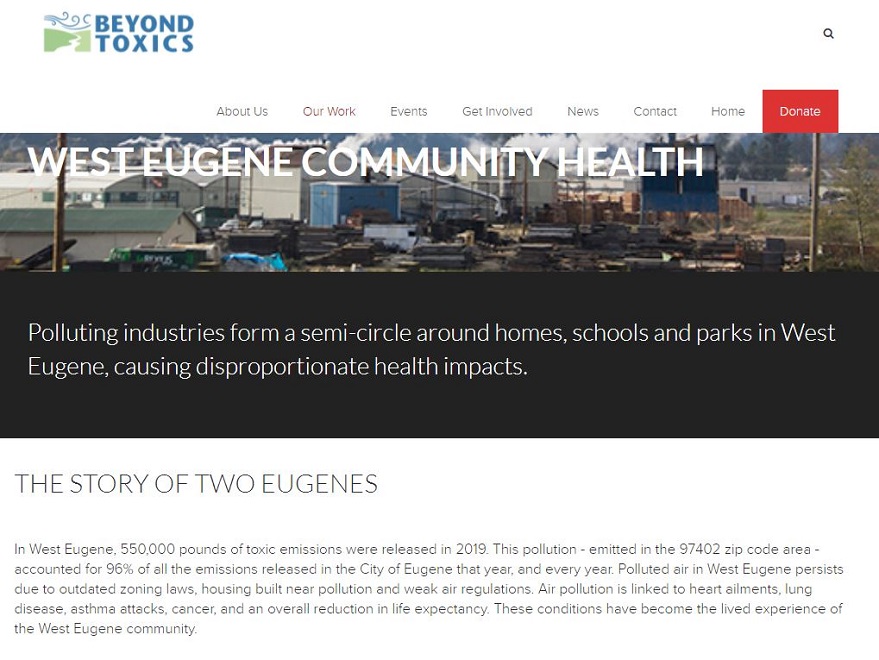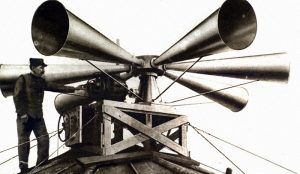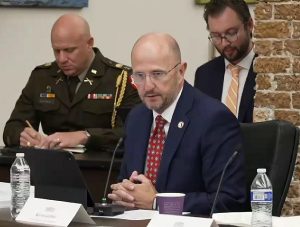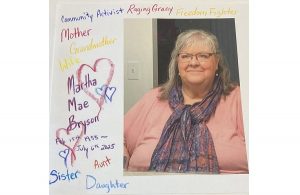LRAPA asked to ban gasoline-powered leaf blowers
5 min read
Public comments recommended a ban on gas-powered landscaping equipment, as 180 other cities have done.
Gas-powered leaf blowers came up at the City Council and at the LRAPA Citizen Advisory Committee.
[00:00:06] On October 25, Eugene City Councilor Matt Keating.
[00:00:11] Councilor Matt Keating: We received communication today from a constituent requesting action around gas-powered landscape equipment, specifically gas-powered leaf blowers. I can see Alan (Zelenka) and Mike (Clark) raising their eyebrows, but the state of California has taken action and the stats stack up against the gas powered leaf blower. So from an environmental standpoint, and from an equity standpoint, I’ve raised the issue with the Lane Regional Air Protection Agency, and was able to get it on the agenda for the Citizens Advisory Committee to report back to LRAPA and LRAPA as an agency will meet again in November. And hopefully we can bring back to Council some recommendations based on studies and the dialogue through the LRAPA Citizens Advisory Committee.
[00:00:54] Councilor Mike Clark: Mr. Keating, I wanted to explain my smile there. It wasn’t really an eye roll so much as a smile. And I don’t want to minimize this issue that so many folks in our communities who feel very, very strongly about it, I know that, after years of hearing public testimony about it. I just want to say that I smiled because your predecessor Betty (Taylor) would bring that up on a very regular basis, especially this time of year. And now I can see several smiles. And I think it comforts all of us to hear you carry on her legacy in that regard. And I think that’s what all of us are smiling at a little bit. So I want to say good job.
Thank you for supporting
local citizen journalism
[00:01:29] John Q: At the LRAPA Citizen Advisory Committee Oct. 26, James Hershiser.
[00:01:36] James Hershiser: Yeah, I’m just here because I reached out to the City Council, Mayor and City Manager email recently about potential leaf blower gas-powered lawn equipment bans. And so I was just here to voice my support for that as well.
[00:01:53] Because it’s been something that California has enacted. And I think that that’s a good model that we could potentially follow. And of course I’m concerned about like landscaping companies getting the proper reimbursements for switching to electric powered equipment or other types of rebates that might be needed to do that. Of course that’s all logistical stuff, but overall, I’m here to voice my support for a gas-powered landscaping equipment ban in Eugene.
[00:02:23] Deb McGee: My name is Debra McGee and I’ve lived in Lane County for 41 years. Carmel, California, 1975. Beverly Hills, 1986, Los Angeles, 1998. I could name over 180 cities that have banned the gas leaf blowers in their city operations as well as community-wide.
[00:02:44] The first reason is noise. Hearing loss can occur at 60 plus decibels at the operator’s ear. Fake gas leaf blowers are 95 to 115 decibels and even 50 feet away, it ranges from 64 to 78 decibels. So the noise levels are literally deafening and they also contribute to stress related health conditions.
[00:03:06] The second reason is health. Leaf blowers stir up dust pollen, spores, herbicides, pesticides, fertilizers, animal feces, and even trace heavy minerals, leaf blowers make allergies worse. This contributes to health problems such as lung cancer, heart disease, strokes, asthma, other respiratory ailments.
[00:03:25] The third reason cities ban these gas-powered tools is greenhouse gas emissions. California officials say that contamination from running a top-selling leaf blower for one hour matches the emissions from driving a 2016 Toyota Camry for 1,100 miles—the distance from Los Angeles to Denver. The bans weren’t voluntary changes—they were mandates. I don’t know exactly what responsibility LRAPA has regarding this issue. I have heard LRAPA say before if it’s legally permitted, but if there’s anything you can do to help us stop these bad products from being used, please do it.
[00:04:07] We’re being told by scientists that every tenth of a degree that we can limit heating may make a difference in our future. So please protect our health and our safety.
[00:04:22] Citizens Advisory Committee chair Jim Daniels: So our next topic is gas powered tools which was initially brought up during the board meeting by a Councilor Keating who looks like he’s listening right now. And so the initial thread seemed to be, what could be done about it. And I think, pretty quickly, Steve identified that LRAPA as an organization does not have jurisdiction to enact a ban and the discussion then transitioned into perhaps having the committee look at ways to encourage alternatives to gas powered tools of that nature and not just leaf blowers but all kinds of small gasoline engines.
[00:05:05] As Travis was saying, probably headed towards more of an informational approach to encourage people to take the path of least harm.
[00:05:14] John Q: One public comment focused on holding agencies accountable.
[00:05:19] Arjorie Arberry-Baribeault: My name is Arjorie Arberry-Baribeault and I am the West Eugene Environmental Justice Organizer for Beyond Toxics. I am sitting in today as a community member with hopes that other community members will want to follow lead and come to join in some of these meetings to get an idea of what’s going on with the advisory board.
[00:05:38] I’m here as a community member and as a parent. Working with Beyond Toxics, I’ve learned that over the span of decades, West Eugene has been battling pollution from their industrial neighbors, with (what seems to the community members) with little or no concern about the families that are being impacted by what’s going on down in West Eugene in the industrial corridor.
[00:06:02] This disconnect for the people impacted with the pollution has unwittingly set a precedent that, ‘I’m sorry that there is no hope for a better quality of life.’ What my goal is, working with Beyond Toxics and with West Eugene, is that we will be able to break down the silos that the community and regulatory agencies have.
[00:06:23] Our hope, my hope is that bridging this gap will re-build the trust and can help establish a new partnership that the people can feel that they can trust the regulatory agencies, such as LRAPA, the DEQ, OHA. I know that that doesn’t have anything to do with you all, as far as the DEQ and the decisions that they make, but I’m grouping you in with them because as a community member and standing as a community member for my community here at the meeting, I just, I want to express to you that now there’s this momentum going on in West Eugene after people have been privy to what’s happening behind the scenes. There’s been a lot of involvement from the community.
[00:07:08] And I just want to say that we’re getting stronger. We’re not, it’s not fading to the back. We’re getting stronger and hopefully more community members will come to these meetings just to hear what you have planned for West Eugene, as far as involving the community with these meetings and West Eugene.




